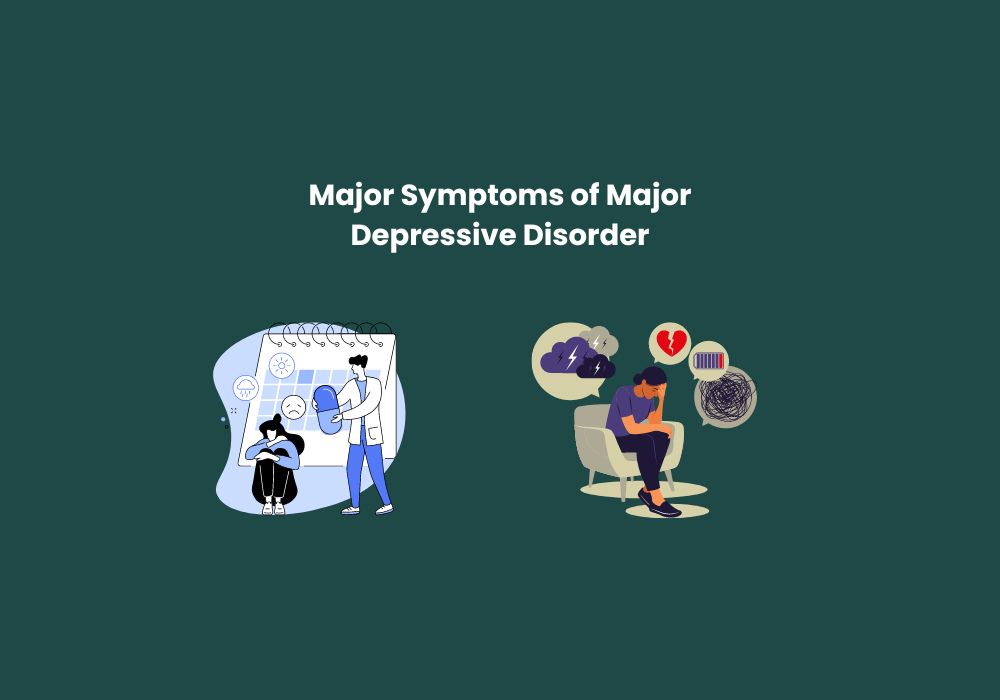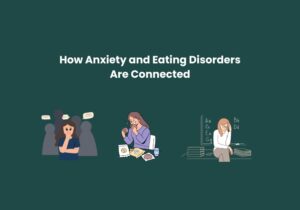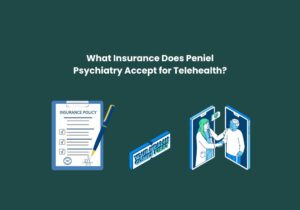Symptoms of Major Depressive Disorder (MDD) include persistent sadness, loss of interest in activities, changes in appetite or weight, sleep disturbances, fatigue, difficulty concentrating, feelings of worthlessness, and thoughts of death or suicide. Major Depressive Disorder (MDD), commonly known as depression, is a serious mental health condition that affects how a person feels, thinks, and handles daily activities. It is characterized by persistent sadness and a lack of interest or pleasure in previously enjoyed activities. Understanding the major symptoms of MDD is crucial for identifying and seeking appropriate treatment.
Before diving into this topic, don’t forget to check out our previous blog post, Understanding Postpartum Depression and Bipolar Disorder. It provides valuable insights into both Postpartum Depression and Bipolar Disorder, helping you better understand these conditions.
Core Symptoms of Major Depressive Disorder
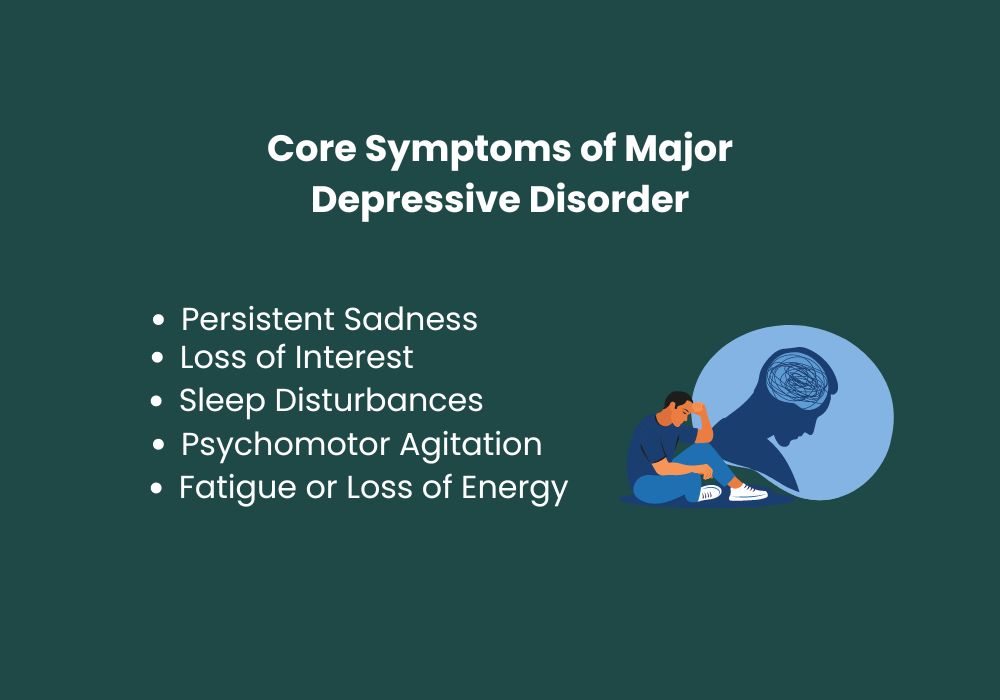
To be diagnosed with MDD, an individual must experience at least five of the following symptoms for a minimum of two weeks. These symptoms must represent a change from the individual’s previous functioning and cause significant distress or impairment in social, occupational, or other important areas of life.
- Persistent Sadness or Low Mood: A continuous feeling of sadness, emptiness, or hopelessness that lasts most of the day, nearly every day.
- Loss of Interest or Pleasure (Anhedonia): Markedly diminished interest or pleasure in all, or almost all, activities most of the day, nearly every day.
- Significant Weight Change or Appetite Disturbance: Significant weight loss when not dieting, weight gain, or a decrease or increase in appetite nearly every day.
- Sleep Disturbances: Insomnia (difficulty sleeping) or hypersomnia (excessive sleeping) nearly daily.
- Psychomotor Agitation or Retardation: Observable restlessness (e.g., inability to sit still) or slowed physical and emotional reactions nearly every day.
- Fatigue or Loss of Energy: Persistent fatigue or a lack of energy nearly every day, makes even small tasks exhausting.
- Feelings of Worthlessness or Excessive Guilt: Feelings of worthlessness or excessive or inappropriate guilt (which may be delusional) nearly every day.
- Difficulty Concentrating or Making Decisions: Diminished ability to think, concentrate, or make decisions nearly every day.
- Recurrent Thoughts of Death or Suicide: Recurrent thoughts of death (not just fear of dying), recurrent suicidal ideation without a specific plan, or a suicide attempt or specific plan for committing suicide.
Addition Symptoms of Major Depressive Disorder and Considerations
- Irritability: Especially in children and adolescents, irritability or anger can be a prominent symptom.
- Physical Symptoms: Some individuals may experience unexplained physical problems, such as back pain or headaches.
- Comorbidity: MDD often coexists with other mental health conditions, such as anxiety disorders, substance use disorders, and personality disorders, complicating the clinical picture.
Seeking Help and Treatment of Major Depressive Disorder
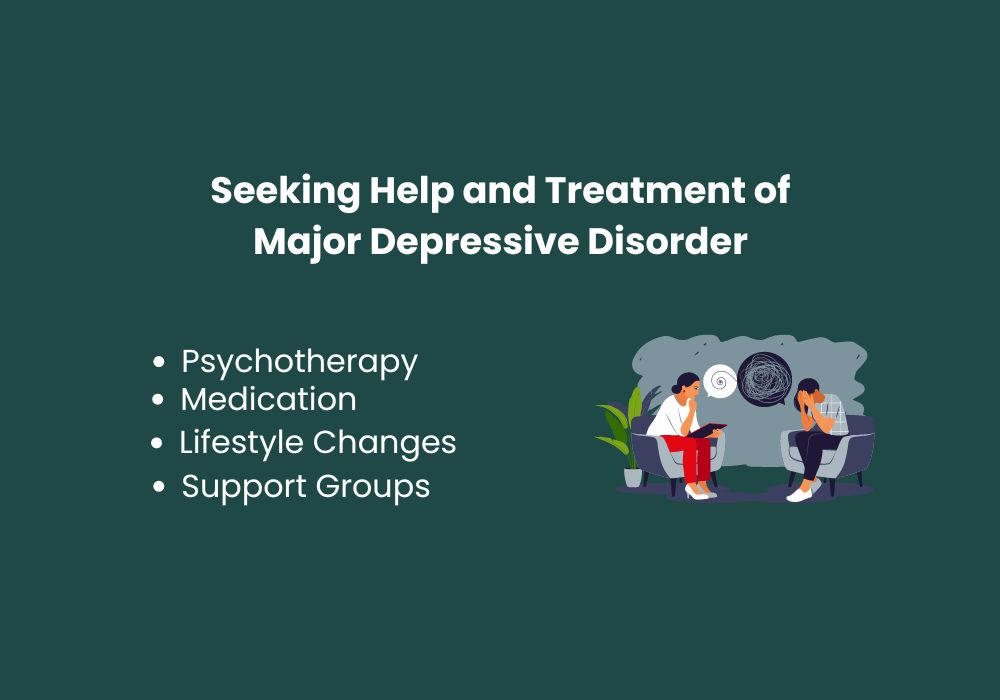
If you or someone you know is experiencing Symptoms of Major Depressive Disorder, it is essential to seek professional help. Treatment options for MDD typically include:
- Psychotherapy: Cognitive-behavioral therapy (CBT), interpersonal therapy (IPT), and other forms of talk therapy can help individuals understand and manage their symptoms.
- Medication: Antidepressants, such as selective serotonin reuptake inhibitors (SSRIs) or serotonin-norepinephrine reuptake inhibitors (SNRIs), can be effective in reducing depressive symptoms.
- Lifestyle Changes: Regular exercise, a healthy diet, adequate sleep, and stress management techniques can support overall well-being and recovery.
- Support Groups: Connecting with others who have similar experiences can provide emotional support and practical advice.
Conclusion
Major Depressive Disorder is a challenging condition, but with the right treatment and support, individuals can manage their symptoms and improve their quality of life. If you or someone you know needs assistance, don’t hesitate to reach out to Peniel Psychiatry for expert guidance and support on your journey to recovery.

